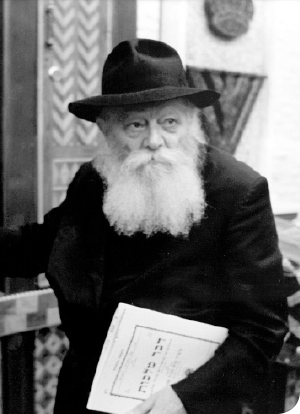Is there a Torah precedent to refer to one person in another’s name with the intention that both are indeed one and the same? * Chapter 17 and FINAL INSTALMENT of Rabbi Shloma Majeski’s Likkutei Mekoros, Volume 2. (Underlined text is the compiler’s emphasis.(
Translated by Boruch Merkur
 BaMidbar 21:21-22: Yisroel [the Jewish people] sent messengers to Sichon Melech HaEmori, saying: Let me pass through your land. We will not turn towards fields or vineyards, nor drink well water; we shall walk along the king’s road, until we have passed through your territory.
BaMidbar 21:21-22: Yisroel [the Jewish people] sent messengers to Sichon Melech HaEmori, saying: Let me pass through your land. We will not turn towards fields or vineyards, nor drink well water; we shall walk along the king’s road, until we have passed through your territory.
Rashi: “Yisroel [the Jewish people] sent messengers”: Elsewhere the sending of messengers is ascribed to Moshe, as it says, “So I sent messengers from the Desert of K’deimos” (D’varim 2:26). A similar contradiction is found in that it says, “Moshe sent messengers to the king of Edom…” (Chukas 20:14), but concerning Yiftach it says, “Yisroel sent messengers to the king of Edom, etc.” (Shoftim 11:17). These verses, however, actually supplement each other; one holds back [information by not informing us who authorized the sending of the messengers] and the other reveals [that Moshe sent them]. Moshe is Yisroel, and Yisroel is Moshe, to teach you that the leader of the generation is equal to the entire generation, because the leader is everything. (Midrash Tanchuma Chukas 23; BaMidbar Rabba 19:28)
* * *
Likkutei Sichos Vol. 35, Parshas VaYigash, pg. 206:
2. It says in the Gemara (Sanhedrin 98b, end)
Rav Yehuda said in the name of Rav: In the future, the Alm-ghty will establish for them another Dovid (who is destined to rule over them as king ––Rashi), as it is said, “They shall serve G-d, their L-rd, and Dovid, their king, whom I shall establish for them” (Yirmiyahu 30:9). Here it does not say “I have established” but “I shall establish.” Rav Papa said to Abayei, yet it is written (Yechezkel 37:25), “Dovid, My servant shall be your nasi (prince) forever” [questioning the need to infer a new, different Dovid who is destined to rule over the Jewish people]. (Abayei answers) It is like the case where there are the positions of both king and half king.
(Rashi: It is like the case where there are the positions of both king and half king: A king and deputy to the king. Thus, the new Dovid shall be king, as it is written, “Dovid their king, whom I shall establish for them,” and Dovid HaMelech will be second to him, as it is written, “your nasi” – “nasi (prince or leader, ruler)” but not “king.”)
[…] How are we to understand the question of Rav Papa, “yet it is written, ‘Dovid, My servant is your nasi forever’”? It seems obvious that “Dovid” mentioned in the verse in Yirmiyahu does not refer to Dovid HaMelech* but to Melech HaMoshiach (as commentators – such as Abarbanel, Radak, Metzudos Dovid – interpret). Indeed, Moshiach is also called “Dovid” (being a descendant of Dovid); Moshiach is the “other Dovid” whom the Alm-ghty will establish as king of the Jewish people.
NOTES:
*Footnote 6: At first glance, we must therefore say that Dovid HaMelech himself is not Melech HaMoshiach, the one destined to be “your nasi forever,” because Melech HaMoshiach will first be active prior to the redemption, as explained in Rambam (Laws of Kings 11:4), and certainly prior to the Resurrection of the Dead (even though tzaddikim will rise immediately [i.e., at the onset of the redemption, but not prior to then], as our Sages say, “Moshe and Aharon among us” (Yuma 5b).)
However, see Yerushalmi Brachos (2:4) and Eicha Rabba (1:51) regarding Malka Meshicha: “Who is Moshiach the King? If he is among the living, his name is Dovid, and if he is among those already deceased, then he is Dovid.” (“If he is among the living: If he is among the living, his name will be Dovid, and if he is among the deceased, it will be Dovid himself.” ––P’nei Moshe). And in the Piut Ometz Yish’echa (of Hoshaana Rabba) “The voice of Tzemach…is Dovid himself.” And Yafeh Anaf on Eicha Rabba interprets it as referring to the opinion that the advent of Moshiach will be after the Resurrection of the Dead [leaving the possibility that Dovid HaMelech could rise to be Moshiach] – see there. Also, see Radak on Yechezkel there (and in a similar vein what is written in Yirmiyahu): “or it is a hint to the Resurrection of the Dead.”
We may therefore assert that the intent with this line of thought is that the soul of Dovid HaMelach will be invested within Melech HaMoshiach, akin to the concept of “Moshe is the first redeemer and he is the final redeemer” (see Shmos Rabba 2:6; Zohar I 253a; Shaar HaP’sukim Parshas VaYechi). That is, even though Moshe is a Levi and Moshiach is from the tribe of Yehuda, the meaning here is that the soul of Moshe invests itself within the final redeemer (Ohr HaChayim VaYechi 49:11). See below Section 3 and note 19*.